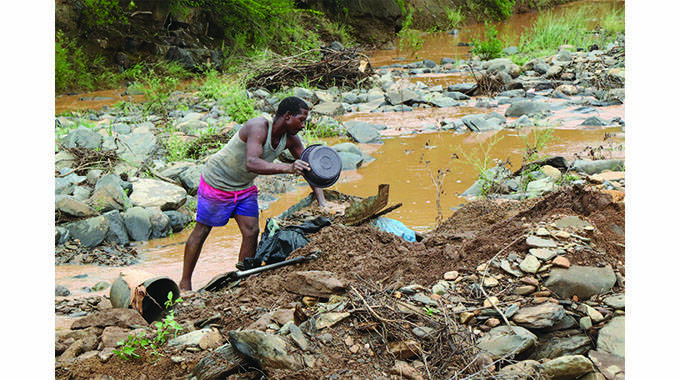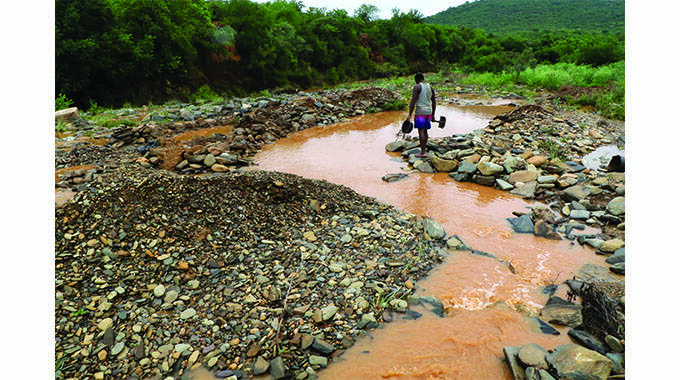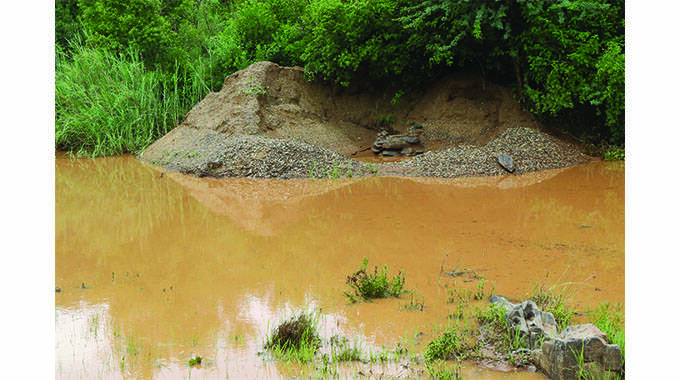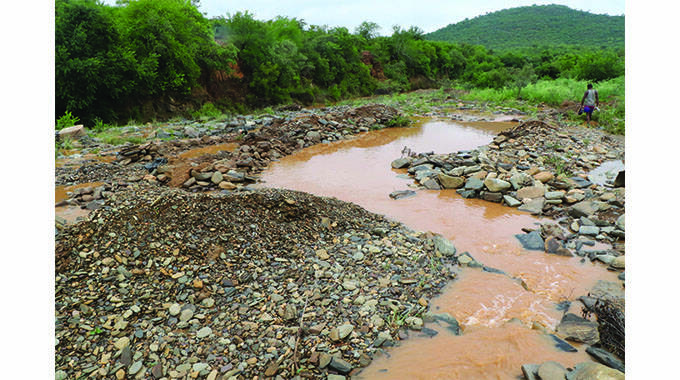The Chronicle

Nqobile Tshili, Chronicle Reporter
ILLEGAL gold panners have destroyed river beds in catchment areas for Bulawayo’s supply dams, raising fears that little water may flow into the reservoirs even if there is a good rainy season.
The six dams that are all in Matabeleland South Province remain critically low, despite rains that are being received in most parts of the country.
Direct precipitation does not fill up dams, the ground needs to be saturated with water first and the run-off then flows into the dams.
 ILLEGAL gold panners have destroyed river beds in catchment areas for Bulawayo’s supply dams, raising fears that little water may flow into the reservoirs even if there is a good rainy season.
ILLEGAL gold panners have destroyed river beds in catchment areas for Bulawayo’s supply dams, raising fears that little water may flow into the reservoirs even if there is a good rainy season.The compromised catchment areas are said to be restricting run-off.
The Zimbabwe National Water Authority (Zinwa) on Wednesday released national dam level statistics showing that Umzingwane is 4,4 percent full while Upper Ncema dam is 1,1 percent full.
The two dams are decommissioned leaving the city with four supply dams; Insiza which is 46 percent full, Lower Ncema 37 percent, Mtshabezi 68 percent, and Inyankuni 37.
Due to low water levels at the city’s supply dams, council is implementing a 72-hour water-shedding programme as part of the strategies to conserve dwindling supplies.
According to the latest council report, councillors expressed concern that failure to rehabilitate Umzingwane riverbed will result in the dams receiving insignificant inflows.
 Zimbabwe National Water Authority (Zinwa)
Zimbabwe National Water Authority (Zinwa)Bulawayo supply dams lie in the gold-rich Umzingwane and Insiza districts where unregulated gold panning is rampant.
Bulawayo Mayor Solomon Mguni said residents should understand that the operations of gold panners were affecting the city’s water bodies.
He said there was no siltation in the city’s dams but there was a need to rehabilitate the dams’ catchment areas.
“Residents assumed that most dams had silted. It was the river beds that needed rehabilitation for the smooth flow of water to the supply dams. More engagements would be done with Central Government and other stakeholders regarding river bed rehabilitation,” he said.
According to the report, 172 gold panners were arrested since the beginning of the year during patrols by council rangers and police.
“Routine patrols were conducted in and around the catchment areas to control environmental damages. During these patrols, a total of 81 items were confiscated including detector machines, crowbars, axes and shovels. The total illegal gold panners arrested since January now stands at 172,” read the report.
In an interview yesterday, Environmental Management Agency (EMA) Matabeleland South manager Mr Decent Ndlovu said illegal gold operations along the river beds of the city’s supply dams could be contributing to the water bodies not impounding water.
“What they do is that they are digging pits some 10 metres deep along the river bed upstream of the city’s supply dams. That means that before the water flows into the dams, it first has to fill up those pits. Most of the time we are receiving flash floods and it can take longer periods without rainfall so the rain may end up not reaching the dams,” said Mr Ndlovu.
He said even the soil that is left on the river beds is also preventing the seamless flow of water to dams.
 Environmental Management Agency (EMA)
Environmental Management Agency (EMA)“Also of concern is that the gold panners are using metal detectors in search of gold. This is what leads them to dig pits which are up to 10 metres deep on the river bed. They are also using mercury to process gold and it can find its way to the city’s supply dams,” he said.
Mr Ndlovu said while efforts are being made to rehabilitate the city’s river beds, more resources need to be deployed towards removing illegal gold panners on site.
Earlier in the year, Chronicle reported how gold panning activities were damaging the Umzingwane Catchment area.
The river bed was littered with pits dug by illegal panners while the catchment area from where water is expected to flow into the river was seriously degraded.
Gold panners apply a hide-and-seek modus operandi whereby they disappear upon seeing strangers and most of the panning is done at night.
 Heaps of sand and stones were strewn across the riverbed while gold panners were sieving for gold.
Heaps of sand and stones were strewn across the riverbed while gold panners were sieving for gold.A Chronicle news crew yesterday witnessed the extent of the damage.
Heaps of sand and stones were strewn across the riverbed while gold panners were sieving for gold.
The news crew assessed areas close to Emzinyathini, but panners are scattered along the entire catchment area.
As the news crew approached two gold panners were digging on the river bed and one of them quickly vanished.
The news crew had to convince the other one as he followed suit, that it was not part of law enforcement agents.
“We don’t trust anyone, after all you could arrest us. We are trying to earn a living for our families,” he said.
He was holding a plastic bowl and a shovel and as soon as he was sure that arrest was not imminent, he continued searching for the yellow mineral.
He flatly denied that panning was affecting water flow to Bulawayo’s supply dams.
“You can see that water is flowing, our activities do not affect the flow of water. After all this is not something new. As I was growing up this was being done but it didn’t stop the water from filling up the dams. The real problem is that there is insufficient rain,” he said.
 Gold panners apply a hide-and-seek modus operandi whereby they disappear upon seeing strangers and most of the panning is done at night.
Gold panners apply a hide-and-seek modus operandi whereby they disappear upon seeing strangers and most of the panning is done at night. “I’m not the only one here, others are upstream while some are downstream. If it rains significantly, I’m sure the dams will fill up.”
The panner also admitted that he was using mercury for his extraction processes.
The chemical poisons animals and plants and is known to cause health disorders that include tremours, insomnia, memory loss, neuromuscular effects, headaches and disorientation, as well as some cancers.
The Second Republic has implemented short to long-term projects to address Bulawayo’s water crisis.
The Government rehabilitated Epping Forest and Rochester Aquifer in Nyamandlovu as part of the short-term solutions to the city’s water crisis.
 Illegal panning along rivers
Illegal panning along rivers But vandalism of electricity infrastructure has seen the council drawing 3 megalitres per day from a possible 20 ML/day and this affects the city.
As a permanent solution to Bulawayo’s water crisis, the Government is constructing Lake Gwayi-Shangani whose completion is set for June next year.
Once complete, it will provide Bulawayo with adequate water and result in the establishment of a greenbelt in Matabeleland North and ensure national food security. — @nqotshili
Article Source: The Chronicle
